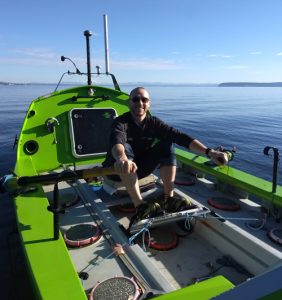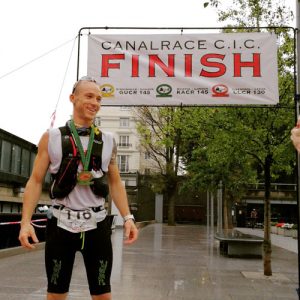By Patrick Daley, Chronicle Staff Writer
Chestertown native Terence Steinberg — an elementary classmate of mine many years ago at St. Mary’s-St. Alphonsus school in Glens Falls — has run 43 marathons, several Ironman races and a 145-mile ultra marathon that took 35 hours to finish — no sleep, all running.

Now he aims to row across the Atlantic Ocean — west to east, Christopher Columbus’s 3,000 mile route following the trade winds from the Canary Islands off Morocco to Antiqua in the Caribbean — next January through April.
Now 32, Terence is a business consultant in Boulder, Colorado. “I haven’t rowed more than five miles before,” he told The Chronicle by phone.
“You don’t need to be an expert at this stuff to do something crazy. What I really want to do with this is to inspire people to trust themselves to do something that they have no evidence to expect that they can do.
“The truth is we can hop a lot farther than we think we can. I want people to say, ‘OK, I’m not going to hop on that next stone. I’m going to cross that river and see what’s over there on the other side.’”
Terence says the inspiration for the voyage is largely his studies at United World College, a global network of 18 high schools that provides full scholarships for students from over 150 countries.
He said he studied for two years in Italy through the program. His main takeaway? “We can have a peaceful, sustainable world, and people have more in common than in difference.” He said he aims to raise enough money to provide UWC scholarships for two more students.
In Chester, exercise was freedom
Growing up in an 1820 farmhouse on Landon Hill in Chestertown until age 16, Terence recalls that “cable television wasn’t even an option — the company didn’t lay cables to where we lived — so I spent my time exploring the woods, walking along the spring-fed creek that provided our house’s drinking water.
“My parents split up when I was young, and my older siblings won scholarships to boarding schools and college, so I got very used to spending time alone. As the saying goes, bored people are boring people — and I learned I can keep myself well entertained on my own.
“I vividly remember getting my first mountain bike at age 8 or 9. The bike meant freedom — when I first saw it I immediately thought to myself, ‘I can ride this to Canada!’ I kept that vision private, dreaming of one day riding away without telling anyone. I began riding three hilly miles to visit friends and make a few bucks mowing lawns. I learned that hilly Adirondack roads were no obstacle and enjoyed the independence that exercise gave me.”

Terence said his first experience running was in 9th grade on North Warren Central School’s cross country team.
“I wasn’t the fastest, but I had grit. In one race I was stride-for-stride with a runner from another team in the final leg. At the finish, I took one final leap and dove across the line, skidding ahead across my belly into the dirt. Over 15 years later, my coach found me on Facebook and told me he tells that story to his athletes.”
Mental health & his dad’s suicide
Terence says he started endurance athletics during a bout with depression when he was a student at Macalaster College in St. Paul, Minnesota. “I didn’t want to go to class. I didn’t want to visit friends.”
A friend, wanting to help, suggested the two do a triathlon. The next year, it was an Ironman competition. Ten years later, says Terence, he had completed 43 marathons and a 145-mile ultra marathon from Bristol to London in the United Kingdom.
He says they are feats of mental more than physical strength. “The longer the event, the more important your attitude is than physical strength If you rely on fitness, you’ll get tired. I used other forms of energy. The strongest and most reliable fuel that I’ve found is gratitude.”
He said he encountered another huge hurdle when his father committed suicide.
“When my dad took his life, I was pretty pissed off. I was running from a place of anger. But by running, I was able to process what happened and reorient myself to the situation. I focus on what I’m grateful for. My legs hurt? My legs hurt because I’m lucky enough to be running, and to not be worried where my next meal is coming from, or the next job I need to get.”
“Gratitude,” he says, “is not just relevant to endurance sports. You could be building your family, working on your mental health, building a business. You should focus on what’s positive in your life. Instead of focusing on what’s holding you back, focus on how you can change that. Focus on the positive and build momentum.”
Taking delivery of $75,000 boat
The Africa to Caribbean path is “one of the most successful routes to row,” Terence says. “About 80% of rows on this route are successful. When I’m sleeping, cooking, writing my blog, I’ll be drifting in the right direction, unless there’s a storm.”
He said his vessel is constructed by SpinDrift Rowing Company in Washington State at a cost of $75,000, and that SpinDrift’s owner, Sonya Baumstein, is advising him in preparation for his ocean row.
Terence expects the boat to be complete in October, when he will begin open-ocean training in the Pacific Northwest.
Technology is key for a solo voyage in the middle of the Atlantic Ocean.
The 23-foot carbon-fiber boat weighs 275 pounds and is equipped with a water maker (the most important piece, says Mr. Steinberg), multiple GPS systems, shortwave radios for contacting vessels, a satellite phone and emergency devices, all of which run on SunPower solar panels.
So what happens if the solar panels malfunction? “When people quit an ocean row, it’s not because they’re tired. It’s because they can’t fix something. It’s more about mind than body.”
Terence said he is funding the vessel purchase through donations to his cause and partners such as SunPower.
He said the Kazan McClain Partners’ Foundation awarded him $25,000, and that as part of the grant, he will visit schools in California’s Bay Area (where Kazan McClain is based) to share with students the importance of mental health and the influence of mind on body.
Terence said he is still seeking sponsors to fulfill needs such as marine outfitting, emergency equipment and electronics, plus various items such as knives, tools, clothing and a life raft.
His worry? Three months alone
“I took a meditation retreat in April to see what it’s like to spend five days alone,” he says. “Thankfully I really enjoyed it, but it’s very different to sit on a mat in a living room than it is to sit in a tiny boat in a huge ocean for three months.
“There’s no way to foresee what I will feel or experience. I’m absolutely scared, but also very, very excited. I think there will be times, not every day, that I’m having the time of my life.
“What I’m worried about is what I’ll find inside myself. We rarely have the opportunity to not be distracted by buzzing, beeping and typing. It’s looking myself right in the eye and what I’ll find there.”
For now, Terence said he spends a lot of time in the gym working with free weights and kettle bells to improve his back, core and legs. He is focusing on flexibility and rotational muscle movement.
He jokes that Boulder is a great place to practice ocean rowing. It’s not. Rowing machines can’t simulate the movement of the ocean.
Terence says he will write and document his experience to share on a blog and social media, a key part of his trip.
“I recognize that it’s a privileged situation and I feel it’s my duty to share what is happening. I’m not a martyr,” he says.
To follow Terence, or to donate to the United World Challenge, visit www.UnitedWorldChallenge.org/Launch.
Copyright © 2019 Lone Oak Publishing Co., Inc. All Rights Reserved.
 Glens Falls Chronicle Serving the Glens Falls/Lake George region; Warren, Washington and northern Saratoga counties since 1980
Glens Falls Chronicle Serving the Glens Falls/Lake George region; Warren, Washington and northern Saratoga counties since 1980

